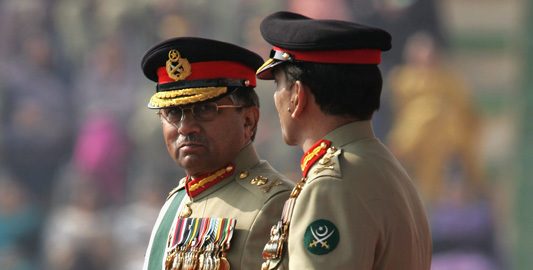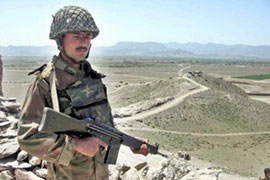Kayani is his own man
Pakistan’s new army chief sets out to revamp the force’s public image.

 |
| Musharraf, left, handed over control of the army to Kayani in November 2007 (GALLO/GETTY) |
In the aftermath of Benazir Bhutto’s assassination, the debate over who will form the next Pakistani government after February’s elections appears to have dissolved into semantics without dilating on the role of the army, the real arbiter of power.
Perhaps it is due to the general perception that Pervez Musharraf, the country’s president and former army chief, has strengthened his position by appointing General Ashfaq Pervez Kayani as his successor-in-uniform.
However, recent events — some quite symbolic — appear to suggest otherwise.
Despite publicly wanting to continue the “war on terror”, Kayani is not straining to keep up appearances with Musharraf following the president’s patronising suggestion last week that they “are two of a kind”.
As Imran Khan, the opposition leader and cricket legend, recently said, “nobody is anyone’s man once he becomes commander-in-chief with 700,000 soldiers under his command”.
Trust deficit?
That change in attitude may have started on the very day Musharraf reluctantly passed the baton to Kayani, forced by circumstances different from October 6, 2001 when Musharraf extended his own term indefinitely.
| Special report |
The tenure of army chief is generally three years, but many in that post stayed on beyond that period in the “nation’s larger interest”. Musharraf stretched that interest for nearly a decade.
Musharraf’s grudging words of praise for his successor with repeated mention of how he trusted the man who had “served under me for 20 years” did not go unnoticed at the handing-over ceremony last November. The tone and tenor bordered on condescension.
A few days later, it was tellingly reinforced at the 18th annual dinner of the Pakistani American Public Affairs Committee (PAK-PAC), where Musharraf went on to say that “Kayani is my student and has worked as my subordinate. He is a man of good head and heart. I feel stronger today.”
However, Musharraf’s action did not reflect that strength.
Even before shedding the uniform, he returned to the presidency the powers he used as army chief to impose a state of emergency.
Many pundits are betting Musharraf may come to rue his decision to continue residing in Army House, citing security issues, despite retiring from the army after 46 years of service.
Not everyone is buying Musharraf’s reasoning. Many belive it is a symbolic move to show he still holds sway over the only constituency he could once legitimately call his own – the military.
Talat Masood, a retired lieutenant-general and prominent defence analyst, suggests that it could be due to administrative convenience but also a refusal to part with his military legacy.
“It may be down to nostalgia with the military that prevents him from leaving that house.”
 |
|
Kayani declared 2008 as “Year
of the Soldier” [EPA] |
Kayani may not share that thought after assuming charge of the world’s sixth largest army.
The new army chief has taken three steps that are more than just subtle hints of his independence from the president. They speak of a person who is his own man and not “two of a kind” as Musharraf insists.
Upon taking charge last November, Kayani declared 2008 as “Year of the Soldier”.
The immediate public response was one bordering on cynicism questioning the need for such a dedication against the backdrop of the army’s deep involvement in politics and businesses.
However, by publicly supporting his lower cadres, the new army chief is implying that Musharraf is someone who does not.
Certainly, the families of soldiers who laid down their lives by the hundreds in a forced and complicated “war on terror” are inclined to agree.
Public image
Masood says Kayani is trying to repair the military’s standing. “Kayani feels the army has suffered as a result of its political involvement and therefore, he is trying to pull it back.”
Javed Ashraf Qazi, former chief of the Inter-Services Intelligence (ISI) agency and once Musharraf’s senior in the army, concurs.
“There is a feeling within the army that it is too involved in politics. It wants to get out.”
Kayani’s second step was to instruct army commanders that they should restrict themselves to the constitutionally-ordained role (defending the country’s borders) and not meet politicians or engage in politics.
It followed guarded and as yet unpublished reports that an army officer who went to meet Musharraf behind the back of his new chief was sacked.
Masood thinks the message has wider implications.
“I think he wanted to give a message to both the army and the international community that the army today is distancing itself from politics and will not be involved as it has been in the past and (that) Musharraf will be conducting himself (only) as a retired military officer … in a civilian capacity.”
Last week, Kayani also replaced Major-General Waheed Arshad, Musharraf’s appointed director general of the army’s public relations wing only a little more than a year after he assumed that role.
The new appointee for the post, Major-General Athar Abbas, is seen as a smart choice given that apart from his track record in the forces he is also the sibling of Pakistan’s best-placed trio of respected media persons.
It is not just a routine appointment, but rather a follow-up on Kayani’s endeavour to create his own equation with the media.
The third step is Kayani’s reported move to soon recall all officers and soldiers working in civil departments to their units.
Hamid Gul, another outspoken former intelligence chief, blames the inherent sweeping powers vested in the army chief.
“Unfortunately, the army chief has too many powers. The leadership structure is such that the corps commanders do not really speak their minds and simply go along with what their chief says.”
Paradigm shift
This probably explains why Kayani is confident of engineering a paradigm shift with the same handful of corps commanders who were until two months ago lining up behind Musharraf.
Masood concludes that it is an institutional imperative.
“In the military, institutional loyalty is more important. This impression that (there is any such thing as) dual loyalty is not true. (Ultimately), it’s the institutional discipline, which stays.”
How much further can Musharraf hold on to power? By his own admission, in his rather aptly titled memoirs In The Line of Fire, he has used up his quota of a cat’s nine lives.
The writer is News Editor at Dawn News, an independent Pakistani television channel.
